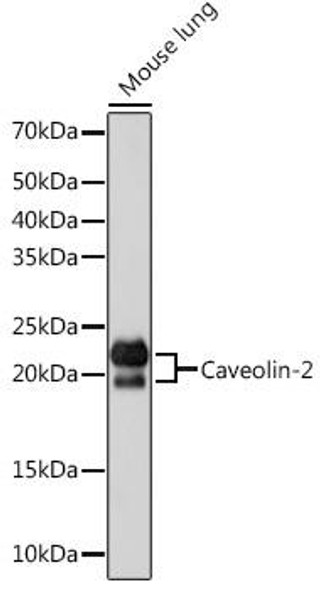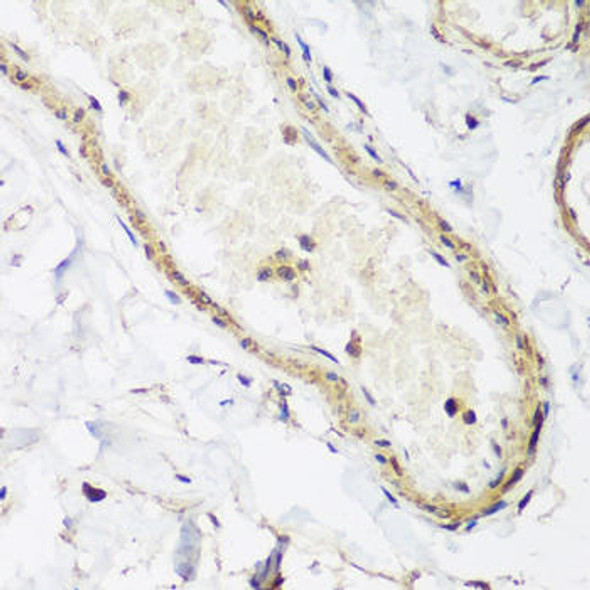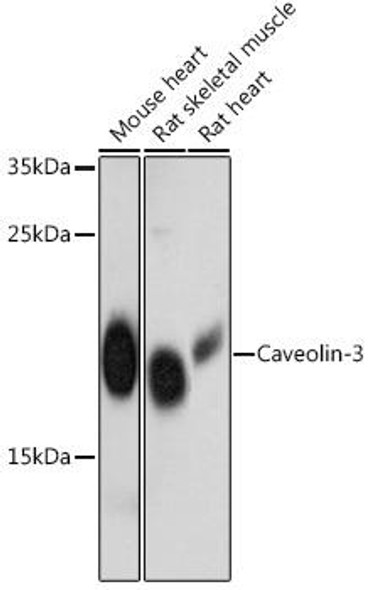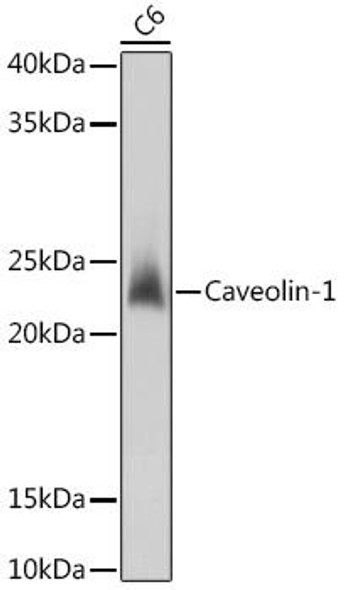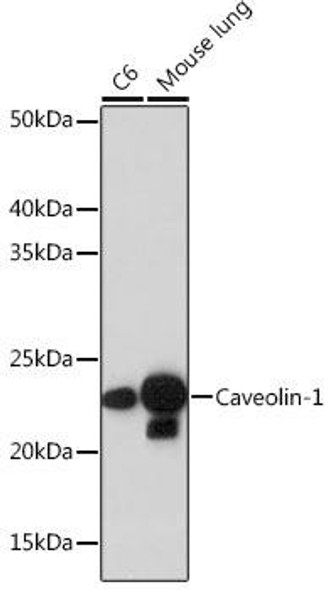Description
| Product Name: | Caveolin-2 Rabbit pAb |
| Product Code: | CAB20549 |
| Size: | 50uL, 100uL |
| Synonyms: | CAV |
| Applications: | WB |
| Reactivity: | Human, Mouse, Rat |
| Host Species: | Rabbit |
| Immunogen: | Recombinant protein of human CAV2 |
| Applications: | WB |
| Recommended Dilutions: | WB 1:500 - 1:2000 |
| Reactivity: | Human, Mouse, Rat |
| Positive Samples: | HeLa, Mouse lung |
| Immunogen: | Recombinant protein of human CAV2 |
| Purification Method: | Affinity purification |
| Storage: | Store at -20°C. Avoid freeze / thaw cycles. Buffer: PBS with 0.02% sodium azide, 0.05% BSA, 50% glycerol, pH7.3. |
| Isotype: | IgG |
| Sequence: | Email for sequence |
| Gene ID: | 858 |
| Uniprot: | P51636 |
| Cellular Location: | Cell membrane, Cytoplasm, Golgi apparatus membrane, Membrane, Nucleus, Peripheral membrane protein, caveola |
| Calculated MW: | 18kDa |
| Observed MW: | 21KDa |
| UniProt Protein Function: | Caveolin-2: a scaffolding protein. A component of caveolae, small invaginations of the plasma membrane found in most cell types. Involved in essential cellular functions, including signal transduction, lipid metabolism, cellular growth control and apoptosis. This protein may function as a tumor suppressor. Interacts directly with G-protein alpha subunits and can functionally regulate their activity. Caveolin-2 may function as an accessory protein in conjunction with caveolin-1. Two splice-variant isoforms have been observed. |
| UniProt Protein Details: | Protein type:Adaptor/scaffold; Motility/polarity/chemotaxis Chromosomal Location of Human Ortholog: 7q31.1 Cellular Component: Golgi apparatus; protein complex; focal adhesion; integral to plasma membrane; caveola; lipid raft; acrosomal membrane; Golgi membrane; transport vesicle; extrinsic to internal side of plasma membrane; membrane; perinuclear region of cytoplasm; plasma membrane; cytoplasmic vesicle; intracellular; nucleus Molecular Function:protein binding; protein homodimerization activity; D1 dopamine receptor binding Biological Process: vesicle fusion; endoplasmic reticulum organization and biogenesis; mitochondrion organization and biogenesis; positive regulation of dopamine receptor signaling pathway; vesicle docking; positive regulation of MAPKKK cascade; vesicle organization and biogenesis; negative regulation of endothelial cell proliferation; insulin receptor signaling pathway; regulation of mitosis; skeletal muscle fiber development; positive regulation of endothelial cell proliferation; negative regulation of transforming growth factor beta receptor signaling pathway; protein oligomerization; positive regulation of GTPase activity |
| NCBI Summary: | The protein encoded by this gene is a major component of the inner surface of caveolae, small invaginations of the plasma membrane, and is involved in essential cellular functions, including signal transduction, lipid metabolism, cellular growth control and apoptosis. This protein may function as a tumor suppressor. This gene and related family member (CAV1) are located next to each other on chromosome 7, and express colocalizing proteins that form a stable hetero-oligomeric complex. Alternatively spliced transcript variants encoding different isoforms have been identified for this gene. Additional isoforms resulting from the use of alternate in-frame translation initiation codons have also been described, and shown to have preferential localization in the cell (PMID:11238462). [provided by RefSeq, May 2011] |
| UniProt Code: | P51636 |
| NCBI GenInfo Identifier: | 5915890 |
| NCBI Gene ID: | 858 |
| NCBI Accession: | P51636.2 |
| UniProt Secondary Accession: | P51636,Q9UGM7, A4D0U2, |
| UniProt Related Accession: | P51636 |
| Molecular Weight: | 12,780 Da |
| NCBI Full Name: | Caveolin-2 |
| NCBI Synonym Full Names: | caveolin 2 |
| NCBI Official Symbol: | CAV2 |
| NCBI Official Synonym Symbols: | CAV |
| NCBI Protein Information: | caveolin-2; caveolae protein, 20-kD; caveolin 2 isoform a and b |
| UniProt Protein Name: | Caveolin-2 |
| Protein Family: | Caveolin |
| UniProt Gene Name: | CAV2 |
| UniProt Entry Name: | CAV2_HUMAN |


